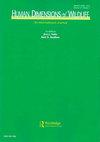了解鲨鱼相关的认知脆弱性及其在鲨鱼潜水中的作用:对保护的启示
IF 1.7
4区 环境科学与生态学
Q2 BIODIVERSITY CONSERVATION
引用次数: 0
摘要
对鲨鱼的负面看法和脆弱情绪一直是有效保护鲨鱼工作的最大障碍之一。这项研究使用了一项针对沿海州(N=616)年轻人的自我报告调查,以研究与鲨鱼相关的风险认知(严重程度和易感性)和寻求感觉的倾向如何影响对鲨鱼的认知脆弱性及其情感、认知和行为结果。路径分析结果表明,感知易感性与对鲨鱼的认知脆弱性呈正相关,而认知脆弱性又与鲨鱼潜水的行为意图呈负相关。感知到的严重程度与更高的恐惧水平、对鲨鱼潜水的不太好的态度有关,并通过态度对行为意图产生负面间接影响。感觉寻求通过态度对鲨鱼潜水的行为意图产生直接和间接影响。描述了人类与野生动物相互作用研究结果的理论和实践意义。本文章由计算机程序翻译,如有差异,请以英文原文为准。
Understanding shark-related cognitive vulnerability and its role in shark diving: implications for conservation
ABSTRACT Negative perceptions and vulnerable feelings about sharks have been one of the greatest barriers to effective shark conservation efforts. This study used a self-report survey of young adults in a coastal state (N = 616) to examine how shark-related risk perceptions (severity and susceptibility) and sensation-seeking tendency influence cognitive vulnerability to sharks and its affective, cognitive, and behavioral outcomes. Results of a path analysis showed that perceived susceptibility was positively associated with cognitive vulnerability to sharks, which in turn was negatively related to behavioral intention to shark dive. Perceived severity was associated with higher levels of fear, less favorable attitudes toward shark diving, and had a negative indirect effect on behavioral intention through attitude. Sensation-seeking had both a direct and an indirect effect through attitude on behavioral intention to shark diving. Theoretical and practical implications of findings in human-wildlife interactions are described.
求助全文
通过发布文献求助,成功后即可免费获取论文全文。
去求助
来源期刊

Human Dimensions of Wildlife
Environmental Science-Nature and Landscape Conservation
CiteScore
4.40
自引率
12.50%
发文量
33
期刊介绍:
Human Dimensions of Wildlife is devoted to the study of social considerations in fisheries and wildlife management.
 求助内容:
求助内容: 应助结果提醒方式:
应助结果提醒方式:


